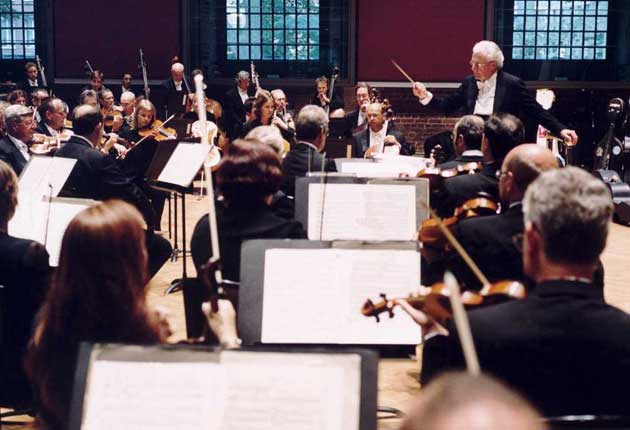Why classical programmes need to be more readable
Concert notes are off-putting and incomprehensible, says Nicola Christie

Your support helps us to tell the story
From reproductive rights to climate change to Big Tech, The Independent is on the ground when the story is developing. Whether it's investigating the financials of Elon Musk's pro-Trump PAC or producing our latest documentary, 'The A Word', which shines a light on the American women fighting for reproductive rights, we know how important it is to parse out the facts from the messaging.
At such a critical moment in US history, we need reporters on the ground. Your donation allows us to keep sending journalists to speak to both sides of the story.
The Independent is trusted by Americans across the entire political spectrum. And unlike many other quality news outlets, we choose not to lock Americans out of our reporting and analysis with paywalls. We believe quality journalism should be available to everyone, paid for by those who can afford it.
Your support makes all the difference.The language of classical music has got itself into a fix. Open any concert programme and you will find lengths of text poring over every detail of a movement; here the clarinet comes in with a bassy tone, here the composer moves from the dominant to the major, here the strings return to the rhythm they introduced themselves with. So what? How and why has it become established that this sort of description is the best introduction to a piece of music?
It was playwright George Bernard Shaw who, in his days as a critic, in 1893, hit on the idea that we are all being fed a lot of nonsense: "I will now, ladies and gentlemen, give you my celebrated 'analysis' of Hamlet's soliloquy on suicide, in the same scientific style" (as the programme note he has just been attacking).
"Shakespeare," wrote Shaw, "dispensing with the customary exordium, announces his subject at first in the infinitive, in which mood it is presently repeated after a short connecting passage, in which mood it is presently repeated after a short connecting passage in which, brief as it is, we recognise the alternative and negative forms on which so much of the significance of repetition depends. Here we reach a colon; and a pointed pository phrase, in which the accent falls decisively on the relative pronoun, brings us to the first full stop."
The point is that breaking down a piece of art, opening it up on an operating table and shining a light on its body parts is not the way to introduce it. To study it, yes, but not to present it to somebody for the first time.
Let's take a look at some recent examples of what George Bernard Shaw would have had a fit about: "The trumpet then launches another sturdy contender in the ensuing moderato, soon overcast with the paler thoughts of the piano before kicking into a different metre for the main Allegro moderato" – an anonymous writer introducing the closing movement of Prokofiev's 4th Piano Concerto (for the Left Hand, interestingly). "The trombones' opening fanfare on the note B flat gives the unaccompanied men's voices their note, and establishes the solemn mood" – another writer presenting the opening of Walton's Belshazzar's Feast, that the reader/listener is intended to experience as solemn.
There is nowhere else in contemporary culture that does this. In a theatre programme you get a blurb about the playwright, a few lines indicating what he/she was trying to do, and a suggestion of how you can further your experience of this playwright/genre; on arrival at a movie you get nothing at all (the offer of popcorn – and that is becoming rare); in a novel you may or may not find a preface to set the tone, but the writer doesn't take you through what you are going to get. So who decided this was a useful approach to music?
"You must remember that a note is read both by the first-time concert goer, the veteran listener and the professional musician," says Philip Flood, the head of London Symphony Orchestra's Discovery – the LSO's inspiring education arm – "It is difficult to strike a balance." The controller of Radio 3 and head of the world's largest classical music festival, the BBC Proms, Roger Wright, says the same. "It is impossible to satisfy the needs of every audience member, as they will come with differing levels of knowledge."
It doesn't really solve the problem. If the rest of the arts are happy to use the concept of a programme as an introduction and not a piece of study text – Flood refers to the "very worst" sort of programme note as reading like "poor A-level teaching" – then why can't the classical music world?
Join our commenting forum
Join thought-provoking conversations, follow other Independent readers and see their replies
Comments